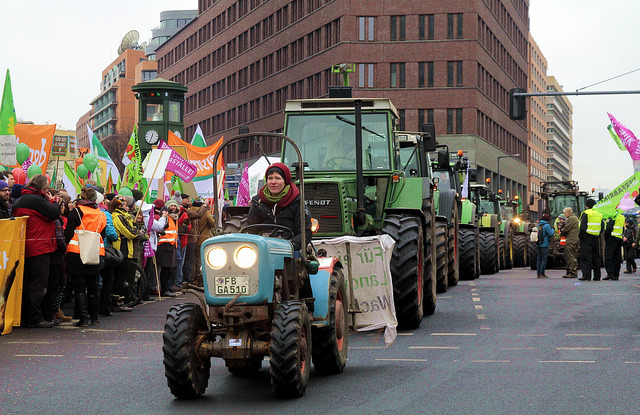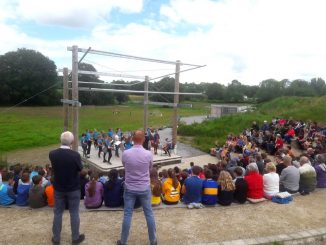
New farmers, women farmers, all land workers, the rejection of risk management tools and of the “privatization of CAP” via insurance schemes are some of the areas European Coordination of Via Campesina (ECVC) have focused on in their two August publications on the current CAP process. Support for traditional agroecological practices – including use of wooded areas by animals, support for smaller scale peasant farmers and for farmer to farmer knowledge – are also pinpointed. Unlike some NGOs and environmental groups, ECVC do emphasise the need for reducing the administrative burden on farmers, while the organisation also rejects what it seems as re-nationalisation in the Commission’s proposals for future EU farm policy.
ECVC make specific proposals for adjusting the Commission’s own proposals, in two documents which we have uploaded.
2018-08-17 ECVC amendements PAC EN
2018-08-06 Analysis future CAP EN
Below we quote from the organisation’s documents directly.
ECVC’s overall position
“The European Commission’s CAP proposal, which is based on simplification and subsidiarity through the Strategic Plans and the new delivery model, entails a serious fragmentation of the policy. It also represents a setback in achieving its objective of cohesion. Despite there being a European framework of common objectives, the degree of fragmentation that the countries experience, and the subsidiarity that the countries experience, will increase the differences between farmers in the European Union. It will also increase the differences between production, working, and economic conditions and lead to distortion of the single market at European level, creating competition through the distribution of CAP financial support. This would worsen the many problems and crises that agricultural markets are facing, without common solutions for a common market.”
What is agricultural activity and who is a farmer?
Commission
“Member States shall provide in their CAP Strategic Plan the definitions of agricultural activity, agricultural
area, eligible hectare, genuine farmer and young farmer.”
ECVC
“The EC should ensure that countries take into account all woodland areas used by animals, without exception, including the resources that come from these areas (fruits, etc.) that animals eat. The European Commission will need to give the Member States some flexibility to evaluate these areas, which are heterogeneous by definition.”
Genuine farmers
ECVC
“ECVC believes that the owners of factory farms, or farms in the form of limited companies that occupy vast areas of land, should not be considered as genuine farmers. Rather, they should be considered as industrialists, who will not benefit from agricultural support. Small-scale farms should be specifically recognised as being employment providers and as having added value, and they should benefit from specific support measures. A person may be considered a small-scale farmer as soon as they have no other significant sources of income.”
Young farmers
ECVC
“New farmers may have been part of a different profession before they started working in agriculture and it is unfair to exclude them from receiving support to set themselves up. The 40-year criterion should not be imposed on Member States.”
Structural Objectives Two (competitiveness) and Six (habitats)
Commission
(2) Increase competitiveness and enhance market orientation (including greater focus on research, technology and digitalisation);
(6) Contribute to the protection of biodiversity, enhance ecosystem services and preserve and rebuild habitats and landscapes;
ECVC
“objective 2 is written very dangerously as it exclusively values the industrial agricultural model, which is based on competitiveness, exports, low prices, economies of scale, and farm expansion. Instead, we should be talking about viable, affordable agriculture on their markets (local markets, national, European and sometimes international markets)….Concerning objective 6: “conserving” is not enough, we must restore habitats and destroyed biodiversity.”
Conditionality (formerly cross-compliance)
ECVC
“ECVC demands the inclusion of social conditionality: the CAP must recognise the value of agricultural work and create respect for workers’ rights and dignity regardless of their status (farmer, employee, seasonal worker or permanent worker)…Conditionality must be more conducive to good practices and not be reduced to monitoring and sanctioning”
Farm Advisory Services
ECVC
“it would be a good opportunity to implement advisory services adapted to small-scale agroecology and processes that work towards agroecology. The training and the exchange of knowledge between farmers should be part of the programmes….values their knowledge…participatory research….orientated towards farm autonomy….”
Direct Payments
ECVC
“ECVC demands a maximum CAP support of EUR 60.000 per small-scale farm. ECVC believes that income and employment should be taken into account in all support allocations. On farms that have more than EUR 60 000 in support, the number of workers to be taken into consideration must be limited. If no maximum support limit is set per farm, the expansion of farms, agro-industrial models and macro-farms in the food production chain will be encouraged…”
Decoupled payments
“…ECVC proposes to make the small farms measure mandatory at a level of support that is adequate enough to provide a genuine income support for many small-scale farmers”
Complementary redistributive income support
Commission
“Member States shall ensure redistribution of support from bigger to smaller or medium-sized farms by providing for a redistributive income support in the form of an annual decoupled payment per hectare…”
ECVC
“ECVC welcomes the Commission’s proposal in favour of small and medium-sized farms, although it believes that it should be further defined”
(Voluntary) complementary income support for young farmers
ECVC “…an effective policy for setting up young people is necessary to tackle the underlying problems, which are insufficient prices that do not cover production costs, access to land and basic payment rights.”
The eco-schemes proposal by the Commission is too vague (so the ECVC comment is full of understandably, questions), while coupled payments should not go on agro-fuels.
Rural Development
should support the following areas:
areas with natural handicaps; measures to help the transition from production systems to small-scale agroecology; life and vitality of the area; new entrants to agroecology; local markets; relocations and regional processing tools; apt organisational structures. (paraphrased)
Risk management tools
Commission
Compulsory for all Member States: the percentage of loss to be eligible for all these tools is increased to 20% with a maximum support of 70% from the CAP.
ECVC
“Risk management must be addressed through public policies. Private insurance is not an alternative and public authorities cannot finance insurance contributions. It is unacceptable to make it compulsory for Member States to financially support production and market risk insurance and/or income stabilisation insurance tools. The compulsory reduction of the insurance trigger threshold to 20% is unacceptable because this reduction will require a substantial budget. This budget will be drawn from rural development policy, which is not intended to finance insurance. We welcome the proposal of a European platform or observatory and crisis analysis, but with the capacity to make proposals that lead to the European Commission taking action. It has already been proven that neither farmers nor Member States believe in this response that uses revenue insurance to deal with market crises. This is evident from the fact that very few countries integrated this type of instrument into the current Rural Development Programmes.”




